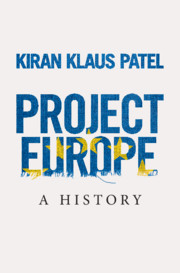Book contents
- Project Europe
- Project Europe
- Copyright page
- Contents
- Figures, Maps and Tables
- Abbreviations
- Frontispiece
- Prologue
- 1 Europe and European Integration
- 2 Peace and Security
- 3 Growth and Prosperity
- 4 Participation and Technocracy
- 5 Values and Norms
- 6 Superstate or Tool of Nations?
- 7 Disintegration and Dysfunctionality
- 8 The Community and Its World
- Epilogue
- Acknowledgements
- Notes
- Bibliography
- Index
Epilogue
Published online by Cambridge University Press: 24 April 2020
- Project Europe
- Project Europe
- Copyright page
- Contents
- Figures, Maps and Tables
- Abbreviations
- Frontispiece
- Prologue
- 1 Europe and European Integration
- 2 Peace and Security
- 3 Growth and Prosperity
- 4 Participation and Technocracy
- 5 Values and Norms
- 6 Superstate or Tool of Nations?
- 7 Disintegration and Dysfunctionality
- 8 The Community and Its World
- Epilogue
- Acknowledgements
- Notes
- Bibliography
- Index
Summary
The book’s Epilogue briefly sketches developments since the Maastricht Treaty. Moreover, it draws the lessons from the history of European integration since the 1950s. Among other things it argues that for a long time there was not just one Project Europe, but many – most of them conceived as alternatives to nationalistic forms of politics. It was by no means inevitable that the European Community would come to be the dominant forum of cooperation and integration in Cold War Western Europe. Not until the 1960s were there growing signs that the EC was on the way to becoming a different class of actor than, for example, the OECD. And even in the early 1980s its status was anything but certain. Rather than proceeding as the implementation of a masterplan, today’s EU appeared in fits and starts. Above the level of detail it set out to make the future more predictable. It was this hope that shines through all the treaties and directives, summits and compromises, plans and proposals. While many saw precisely that as a value in its own right, the idea of Project Europe as an attempt to contain the future is less certain again today.
- Type
- Chapter
- Information
- Project EuropeA History, pp. 268 - 283Publisher: Cambridge University PressPrint publication year: 2020



